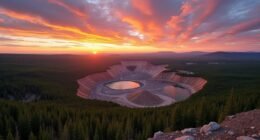In the 1980s, a band of maverick ecologists shook up conventional thinking, promoting holistic views of nature over the fragmented ideas of the past. Think of ecosystems as a complex sandwich rather than lonely ingredients. Visionaries like James Lovelock, with his Gaia Hypothesis, argued that Earth behaves like a self-regulating organism. Others, like the Odum brothers, brought social considerations into the mix. Their ideas paved the way for innovative approaches that could help heal our planet today. Curious about how their insights apply now?
Maverick Ecologists: Pioneers of Holistic Thought
In the vibrant tapestry of the 1980s, a handful of visionary thinkers emerged as the “maverick ecologists,” shaking up the status quo like a snow globe in a blizzard. These trailblazers challenged conventional wisdom, pushing against reductionist theories that simplified ecosystems into isolated parts. They argued instead for a holistic view, one that recognized the intricate web of life—a little like realizing that a sandwich isn’t just bread and lettuce; it’s the perfect blend of flavors that makes it a meal.
Among these mavericks was James Lovelock, who proposed the audacious Gaia Hypothesis, suggesting that Earth functions as a self-regulating organism. His ideas were supported by the brilliant Lynn Margulis, who likened ecosystems to interconnected “super-organisms.” Critics had a field day, claiming the theory lacked scientific rigor, but the movement it inspired was undeniable—much like a catchy tune that refuses to leave your head. This interconnectedness of life mirrors the ecosystem concept established by Arthur Tansley, emphasizing the importance of relationships among organisms and their environments.
James Lovelock’s Gaia Hypothesis redefined our planet as a self-regulating organism, igniting a movement that resonates like an unforgettable melody.
Then there were the Odum brothers, Eugene and Howard, who pioneered systems ecology. Their work emphasized that human and social factors are not just side dishes in ecological studies, but main courses. They shifted the focus of research to how ecology intertwines with modern life, earning accolades like the Crafoord Prize, which sounds fancy enough to impress any dinner guest. Their approach remarkably aligns with traditional wisdom of indigenous peoples who have long practiced holistic land management considering all elements of nature as interconnected.
As the 1980s progressed, invasion biology emerged, addressing the chaos of species moving around like party crashers at an ecosystem soirée. Mark A. Davis and others argued against rigid definitions of “native” versus “invasive,” suggesting a more adaptive approach to managing ecosystems in our rapidly changing world, particularly by highlighting the need for collaboration with citizens in decision-making processes.
Finally, Herb Bormann tackled forest conservation, revealing the ecological costs of clear-cutting. His findings sparked debates about sustainable practices, reminding us that we can’t just chop down trees and hope for the best.
These maverick ecologists, through humor, creativity, and fierce advocacy, painted a compelling case for a planet worth saving.









